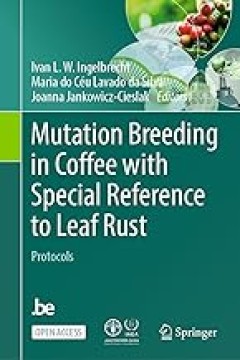Filter by

The Wheat Genome
This open access book provides the first comprehensive coverage of the wheat genome sequence since the publication of the draft and reference sequences for bread wheat and durum wheat. It presents an overview and all aspects of the gold standard sequence of the bread wheat genome, IWGSC RefSeq v1.0 and its subsequent improvements through 2022 (IWGSC RefSeq v2.1), as well as the sequencing of mu…
- Edition
- -
- ISBN/ISSN
- 978-3-031-38294-9
- Collation
- XIV, 320
- Series Title
- -
- Call Number
- -

Becoming A Young Farmer
This open access book is based on a multi-country collaborative research project focussing on Canada, China, India, and Indonesia. It responds directly and concretely to concerns about the generational sustainability of smallholder farming worldwide– reflected in the current UN Decade of Family Farming. Drawing on research that asks how (some) young people continue to pursue a (future) li…
- Edition
- -
- ISBN/ISSN
- 978-3-031-15233-7
- Collation
- XXII, 444
- Series Title
- -
- Call Number
- -

Wheat Evolution and Domestication
This open access book covers a century of research on wheat genetics and evolution, starting with the discovery in 1918 of the accurate number of chromosomes in wheat. We re-evaluate classical studies that are pillars of the current knowledge considering recent genomic data in the wheat group comprising 31 species from the genera Amblyopyrum, Aegilops, Triticum, and other more distant relatives…
- Edition
- -
- ISBN/ISSN
- 978-3-031-30174-2
- Collation
- XXIII, 673
- Series Title
- -
- Call Number
- -

Mutation Breeding in Coffee with Special Reference to Leaf Rust
This open-access book provides a comprehensive overview of current methodologies for improving resistance to leaf rust in coffee, one of the world's most important cash crops and beverages. Coffea arabica L. (Arabica) accounts for about 60% of the world's coffee production. Coffee leaf rust (CLR), caused by the fungus Hemileia vastatrix is the major disease affecting Arabica coffee resulting in…
- Edition
- -
- ISBN/ISSN
- 978-3-662-67272-3
- Collation
- XX, 314
- Series Title
- -
- Call Number
- -

Closing Rice Yield Gaps in Asia
This open access book contributes not only to the scientific literature on sustainable agricultural development and in particular rice agriculture but also is highly valuable to assist practitioners, projects, and policymakers due to its sections on reducing carbon footprint, agricultural innovations, and lessons learned from a multi-country/multi-stages development project. The scope of …
- Edition
- -
- ISBN/ISSN
- 978-3-031-37946-8
- Collation
- XXVII, 259
- Series Title
- -
- Call Number
- -

Agricultural Implications of Fukushima Nuclear Accident (IV)
This open access book presents the findings from on-site research into radioactive cesium contamination in various agricultural systems affected by the Fukushima Daiichi Nuclear Power Plant accident in March 2011. This fourth volume in the series reports on studies undertaken at contaminated sites such as farmland and forests, focusing on soil, water, mountain, agricultural products, and animal…
- Edition
- -
- ISBN/ISSN
- 978-981-19-9360-2
- Collation
- XIII, 276
- Series Title
- -
- Call Number
- -

America's Food: What You Don't Know About What You Eat
We don't think much about how food gets to our tables, or what had to happen to fill our supermarket's produce section with perfectly round red tomatoes and its meat counter with slabs of beautifully marbled steak. We don't realize that the meat in one fast-food hamburger may come from many different cattle raised in several different countries. In fact, most of us have a fairly abstract unders…
- Edition
- -
- ISBN/ISSN
- 9780262268653
- Collation
- 1 online resource (ix, 336 pages) :illustrations, map
- Series Title
- -
- Call Number
- -

Organic struggle :the movement for sustainable agriculture in the United States
'Organic Struggle' analyzes the evolution of the sustainable agriculture movement in the United States and evaluates its achievements and shortcomings. It traces the development of organic farming from its roots in the 1940s through its embrace by the 1960s counterculture to its mainstream acceptance and development into a multi-billion dollar industry.OCLC-licensed vendor bibliographic record.
- Edition
- -
- ISBN/ISSN
- 9780262328302
- Collation
- 1 online resource (327 pages).
- Series Title
- -
- Call Number
- -

The new American farmer :immigration, race, and the struggle for sustainability
OCLC-licensed vendor bibliographic record.
- Edition
- -
- ISBN/ISSN
- 9780262355841
- Collation
- 1 online resource (192 pages) :illustrations.
- Series Title
- -
- Call Number
- -

California cuisine and just food
An account of the shift in focus to access and fairness among San Francisco Bay Area alternative food activists and advocates.OCLC-licensed vendor bibliographic record.
- Edition
- -
- ISBN/ISSN
- 9780262305853
- Collation
- 1 online resource (xvii, 354 pages) :illustrations, maps.
- Series Title
- -
- Call Number
- -
 Computer Science, Information & General Works
Computer Science, Information & General Works  Philosophy & Psychology
Philosophy & Psychology  Religion
Religion  Social Sciences
Social Sciences  Language
Language  Pure Science
Pure Science  Applied Sciences
Applied Sciences  Art & Recreation
Art & Recreation  Literature
Literature  History & Geography
History & Geography